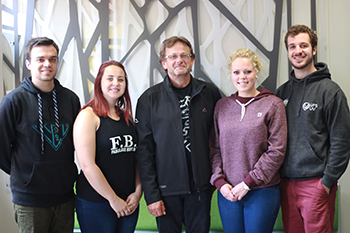
Four postgraduate students from the University of the
Free State received bursaries from the National Arts
Council this year. They are, from the left: Gerrit Fourie,
Maryn Hattingh, Prof Pieter Venter, Programme Director
of drama at the UFS, Stella Nortier, and Franco de Wet.
Photo: Esté Strydom
Thanks to bursaries from the National Arts Council (NAC), many students are finding it easier to study Drama and Theatre Arts, the discipline is able to offer more job opportunities, and it provides an opportunity to those who probably would never have had the chance. This is according to Prof Nico Luwes, Head of the Department of Drama and Theatre Arts at the University of the Free State (UFS).
This year, several students from the UFS, including 12 undergraduates and four postgraduates, are again beneficiaries of NAC bursaries to the value of roughly R206 000 – about R150 000 of which will be used for undergraduate studies and R56 000 for postgraduate studies. The UFS was awarded the same amount for undergraduate students in the previous year, but didn’t then receive NAC bursaries for postgraduate studies.
Good relationship with NAC over many years
The UFS has received NAC bursaries since 2005, and Prof Luwes says the university’s good relationship with the council runs over many years. “They are very happy with the feedback on our students’ achievements,” he says.
“Although Dramatic Arts is a matric subject, the provincial department of education does not support students with education bursaries for this subject. With bursaries from the National Arts Council, students can thus study to become theatre artists, and work as teachers for the Dramatic Arts in schools.”
Alumni stand out in entertainment industry
Prof Luwes says his department provides students the opportunity to do performances and practical exams in English, Afrikaans, and Sesotho. This is done to give all students an equal opportunity to excel. “In addition, several of our alumni have achieved success in the entertainment industry, and our staff members often feature in professional performances at arts festivals.”
Undergraduate students who were awarded NAC bursaries:
• Jolene Swartz
• Boitumelo Mohutsioa
• René Lombard
• Mandisa Wiso
• Thapelo Mabona
• Charlize Oberholster
• Thembisile Baai
• Naledi Maolusi
• Mbuyiselo Nqodi
• Vuyiswa Mxasa
• Deandi Scholtz
• Dylan Britz
Postgraduate students who were awarded NAC bursaries:
• Gerrit Fourie
• Maryn Hattingh
• Stella Nortier
• Franco de Wet